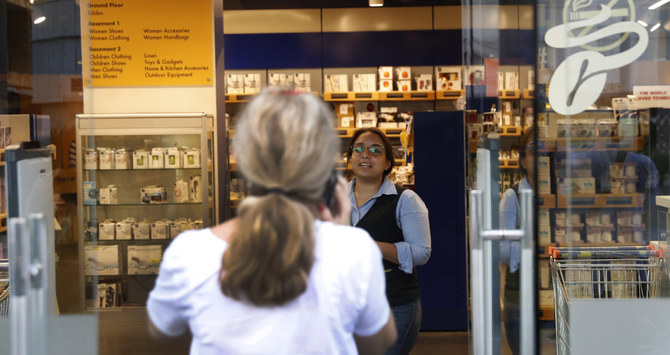by middleeastmonitor.com — The usually grand Baalbek Music Festival, set among 3,000-year-old Roman ruins in Lebanon, was reduced to just a single concert this year by the COVID-19 pandemic. For maestro Harout Fazlian, however, it was one of the most special of his career. On a stage in the ancient temple of Bacchus, Fazlian conducted […]

Opinion by David Ignatius — washingtonpost.com — A grim new chapter in the Saudi “Game of Thrones” battle for control of the kingdom appears to be underway, as Crown Prince Mohammed bin Salman prepares corruption and disloyalty charges against his predecessor and onetime rival, former crown prince Mohammed bin Nayef — a man who was once the United States’ champion in the war against Islamist terrorism. This royal family showdown has been building ever since MBS, as he’s known, deposed his predecessor in June 2017. The roots lie even deeper, in the bitter rivalry between supporters of the late King Abdullah, who had championed MBN, as the former crown prince is called, and the courtiers who surrounded his successor, King Salman, and his impulsive son MBS, when the new king assumed power after Abdullah’s death in January 2015.
Saudi and U.S. sources say that MBS’s anti-corruption committee is nearing completion of a detailed investigation of allegations that MBN improperly diverted billions of Saudi riyals through a network of front companies and private accounts while he was running Saudi counterterrorism programs at the Interior Ministry. MBN served there as chief assistant to his father, Prince Nayef, and then succeeded him as minister from 2012 to 2017. An associate of MBN’s said Saudi investigators have demanded that he repay $15 billion they claim he stole, though it isn’t clear how they reached that number. The associate, like some others contacted for this article, requested anonymity because of the sensitivity of the matter. MBN’s supporters say these charges are false — and are contradicted by a 2007 royal decree from King Abdullah that authorized all of MBN’s activities and provided for a detailed annual report on his spending. Internal Saudi documents provided by an associate of MBN’s and reviewed by The Post support MBN’s contention that his secret financial activities were approved, at least in broad outlines, by the late king.
by arabnews.com — DUBAI: Cyprus will no longer accept flights coming from Lebanon from July 6, national newspaper the Daily Star reported, citing a statement from the Cypriot Embassy. The statement said the decision was based on a classification system that determines countries’ epidemiological criteria amid the coronavirus pandemic. But Cypriot nationals and residents would […]

by arabnews.com — DUBAI: Model and philanthropist Jessica Kahawaty has taken to social media to raise awareness about Lebanon’s deepening economic crisis amid the coronavirus pandemic. According to reports, the economic crisis coupled with the health pandemic can lead to a famine in the Levant country. Kahawaty, who is part Lebanese and part Australian, took to her Instagram Stories to explain the seriousness of Lebanon’s worsening economic crisis and hyperinflation. “For non-Lebanese to understand the severity of what’s happening in Lebanon: $100 used to give you 150,000 Lebanese Liras,” she wrote. “Due to the deteriorating state of the country, $100 gives you 900,000 Lebanese Liras. If you’re living and working in Lebanon and your salary a year ago was 4.5 million Liras per month, today that salary is worth $450. Severe inflation is reflecting an increase in prices in the supermarkets,” she added, before urging her followers to donate to different organizations helping on the ground in Lebanon. “If you know of more organizations, please DM me so I can share,” she wrote alongside links to several Lebanese NGO’s and charities that provide assistance to Lebanese families struggling to put food on the table.


By Nasser Saidi — thenational.ae — Lebanon is in the throes of an accelerating economic and financial meltdown. Unsustainable monetary and fiscal policies and an overvalued, pegged exchange rate led to persistent fiscal and current account deficits. Public debt, which reached more than 155 per cent of gross domestic product in 2019, is projected to rise to 161.8 per cent in 2020 and 167 per cent in 2021, according to International Monetary Fund estimates. That is the third-highest ratio in the world after Japan and Greece. Informal capital controls, foreign exchange licensing, freezing of deposits and payment restrictions to protect the dwindling reserves of Lebanon’s central bank, precipitated the financial crisis, generated a sharp liquidity and credit squeeze and the emergence of a system of multiple exchange rates. The squeeze is severely curtailing domestic and international trade and resulted in a loss of confidence in the monetary system and the Lebanese pound. Multiple exchange rates created distortions in markets and new opportunities for corruption. The result is a sharp, double-digit contraction in economic activity, consumption and investment, surging bankruptcies, and rapidly rising unemployment rates estimated at above 30 per cent.
A dangerous inflationary spiral has gripped the country with the currency’s value against the dollar nosediving as much as 80 per cent. Inflation is on the rise and reached an annual 56 per cent in May, according to Lebanon’s Central Administration of Statistics. A Bloomberg survey of economists conducted in June, projects inflation will average 22 per cent in 2020 compared with a forecast of 7.7 per cent from a previous survey. The minimum wage has shrunk from the equivalent of $450 per month while food prices have surged. Since the end of a 15-year civil war in 1990, extreme poverty has hovered at between 7.5 to 10 per cent, while about 28 per cent of the population is poor, according to the World Bank. In November, the World Bank warned if the economic situation in the country worsened, those living below the poverty line could rise to 50 per cent. Given the collapse of the long-maintained peg, there is no anchor for expectations of the future value of the Lebanese pound.

by aawsat.com — Lebanon’s electricity crisis severely worsened over the past few days, with power outages extending to 20 hours per day even in the capital. Many generator owners have raised the monthly tariff because of the high cost of diesel and reduced subscription hours, which drowned several areas in total darkness that was only broken by candlelight. The electricity crisis prompted a number of stores, especially small ones, to stop buying food commodities that need a refrigerator. Minister of Energy Raymond Ghajar said that power rationing was due to the lack of fuel, citing “judicial reasons” behind the delay of delivery by fuel ships.
In response, member of the Progressive Socialist Party (PSP) and electricity expert Mohammed Basbous stressed that the ministry was required to provide further information on the matter. “It’s surprising that we currently face an electricity crisis, especially since the Algerian Sonatrach company announced that it would commit to supplying Lebanon with the amount of fuel it needs and would refrain from renewing the contract at the end of the year,” he told Asharq Al-Awsat. “The electricity crisis was supposed to start at the end of the year and not now, if no alternatives were found,” he emphasized.

by NAJIA HOUSSARI — arabnews.com — BEIRUT: Residents of Tfail, a Lebanese farming community on the border with Syria, say they are powerless to stop their farmland being destroyed by bulldozers watched over by gunmen who appear intent on taking control of the town. According to anxious residents, confusion over the boundary between Lebanon and Syrian is adding to the problem, with many sections of the border yet to be demarcated. The issue has drawn the attention of Lebanese leaders, with former prime minister and head of the Future Parliamentary Bloc Saad Hariri last Tuesday voicing his “deepest concerns” over developments in the village. Hariri suggested the threat to Tfail might be part of “a dark scheme of displacing its inhabitants as part of plans to make demographic changes in the region.”
The Lebanese-Syrian border is 380 km long, but only a 40 km section was demarcated in 1935 after greater Lebanon was established. The war in Syria has stalled attempts to demarcate the rest. Syrian Foreign Minister Walid Al-Muallem said 10 days ago that his country “will not demarcate the borders with Lebanon, neither will it accept the deployment of international forces on the borders, for this is only done among enemies.” Tfail resembles a peninsula within Syrian territory, and there is no access to the town from the Lebanese side. In order to get to other Lebanese cities or towns, residents have to go to Damascus before heading to their destination in Lebanon and vice versa. However, the war in Syria, and particularly the battles in the Syrian Qalamoun mountains, led to the displacement of Tfail’s residents, Lebanese or Syrian refugees who headed to various Lebanese regions via the town of Brital. Tfail residents work in agriculture or serve in the Lebanese army. Most of the townsmen are Sunnis.

by NAJIA HOUSSARI — arabnews.com — BEIRUT: Lebanon’s banks will ease restrictions on US dollar withdrawals following a surprise announcement on Thursday by the head of the country’s banking association. Salim Sfeir, chairman of the Association of Banks in Lebanon (ABL), said that US dollars will be supplied by the banks with the support of Lebanon’s central bank. Lebanese banks last November imposed strict limits on US dollar transfers amid an economic and political crisis that led to the collapse of the Lebanese pound. The curbs were introduced as the government and central bank struggled to ease the worst economic crisis since country’s civil war. Sfeir made his announcement after meeting Saudi Ambassador to Lebanon Walid bin Abdullah Bukhari as part of an ABL delegation.
Following the meeting, Sfeir said that he wanted to put the Saudi ambassador “in the picture of the current economic situation in Lebanon.” He praised the Kingdom’s generosity and said “economic life will be back to normal in Lebanon.” The US dollar exchange rate reached its highest level on Thursday, scoring between 9,500 and 9,600 Lebanese pounds, while money dealers adopted a rate of between 3,850 and 3,900 Lebanese pounds. Riad Salame, the central bank governor, told a government session that “the volume of US dollars circulating on the black market does not exceed 5 percent (of the hard currency market) and does not reflect the actual exchange rate of the US dollar.” Meanwhile, Lebanese political leaders held a series of meetings on Thursday amid growing popular demands for the resignation of Prime Minister Hassan Diab’s government.

by reuters.com — TRIPOLI, Lebanon (Reuters) – For Amer al Dahn, the idea of eating meat is now a dream. Today, he can’t even afford bread and depends on credit from the local grocer to feed his wife and four children in the Lebanese city of Tripoli.“We can no longer buy meat or chicken. The closest we get to them is in magazines and newspapers,” said Dahn, 55, leafing through a supermarket brochure in his cramped apartment. Living in one of the poorest streets of Lebanon’s poorest city, Dahn and his family are feeling the full force of a financial meltdown that is fuelling extreme poverty and shattering lives across the country.
In the capital Beirut, a 61-year-old man shot himself in the head on the busy Hamra street on Friday. Reuters could not establish his motives, but local media attributed the suicide to hunger. Struggling to walk because of diabetes, Dahn already faced a difficult life before the crisis which has sunk the Lebanese pound by 80% since October, driving up prices in the import-dependent economy. “Life has become very difficult. The dollar is still climbing and the state is incapable of providing a solution.” Even chickpeas, beans and lentils – a traditional part of the Lebanese diet – are out of reach for some.

Associated Press — BEIRUT: Major retailers in Lebanon announced Thursday they will temporarily shut down in the face of an increasingly volatile currency market and their inability to set prices while the Lebanese pound plunges against the dollar. Later in the day, owners of the businesses rallied in central Beirut to denounce the government’s inability to handle a deepening economic and financial crisis, and urging others to join them. “The company is losing and … (the customers) think we are robbing them,” Samir Saliba, owner of sportswear retailer Mike Sport, told The Associated Press. “We want a clear economic policy to know how to move forward and not buy our dollars from the black market and be humiliated with the brokers and money changers.” The protesters called on the government to resign and urged other stores to join their protest shutdown.
The Lebanese pound recorded a new low Thursday, selling at nearly 10,000 for a dollar and maintaining the downward slide that saw the national currency lose about 85% of its value over the past months. Despite government and central bank efforts to regulate the foreign currency rate, a parallel market has thrived and inflation is soaring as the dollar becomes increasingly scarce. Amid the tumbling pound, prices and inflation have soared. Power cuts have also increased, as the government struggles to secure fuel and diesel, while grocery stores began imposing a limit on how many items customers can buy amid a rush to hoard basic goods.



